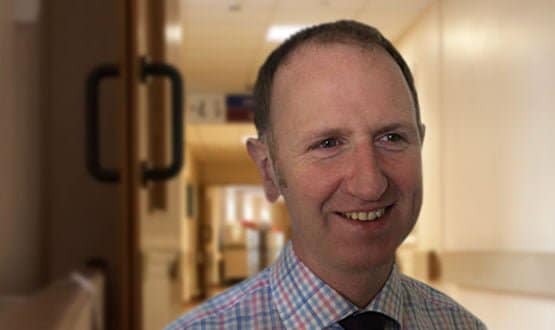Two days a week, Dr Jonathan Richardson is Northumberland, Tyne and Wear NHS Foundation Trust’s clinical director of informatics, and the remaining three he is a consultant in old age psychiatry.
He says the chief clinical information officer-like role he took on last June gives him a “foot in both camps” – clinical and managerial – enabling him to translate initiatives back to his clinical community.
Dr Richardson’s role as clinical director of informatics was based on the clinical informatics job description set out in the Health Informatics Career Framework.
He is also one of the first 12 clinicians in the North East to complete a Clinical Leadership Fellowship. Because, at the heart of his new role, he says, is the need for clinical leadership.
“I think this is much more about clinical leadership than anything else,” he argues. “Clinicians should be working in partnership with their local chief information officer and IT teams.”
Dr Richardson is an enthusiastic advocate of the need for local clinical information champions and what they can achieve.
As well as his local roles at Northumberland, Tyne and Wear, he is chair of the Royal College of Psychiatrists informatics committee and chair of the North East Clinical Health Informatics Forum.
He argues that information is at the heart of patient care, and he wants to make sure that “clinicians can help shape the next generation of clinical systems.”
Mental health comes into its own
Dr Richardson is particularly proud of the strides that mental health services have made in information use over recent years.
“There are about 60 mental health trusts and 18 have a clinical information lead or director of informatics. That’s pretty impressive,” he says.
In line with this, the sector has become a heavy user of electronic health records, in part as a result of the National Programme for IT in the NHS.
Mental health trusts were one of the main beneficiaries of the programme. For instance, in London 70% of mental health trusts now have RiO electronic patient record systems, making information sharing far easier.
“Within the mental health community there has been a real North/South divide created by NPfIT,” Dr Richardson says. “Although this hasn’t stifled innovation in the North, it has made it more difficult and made the clinical director roles and engagement even more important.”
Increasingly, mental health trusts are looking to make these electronic patient records available to community- based staff. “In mental health, the narrative of the patient story is hugely important, which is why access to a shared care record is so vital,” Dr Richardson explains.
But he argues that good, electronic information is important to many facets of mental health services. “It enables patients to make decisions about their care, judge whether they are getting good quality care from a healthcare provider organisation or individual professional, and lets them understand outcomes.”
For a health professional, information helps them understand their performance. “Are they good at what they do? How do they compare to their colleagues?” Good quality information is also vital to both measuring the quality of care and professional revalidation.
Dr Richardson adds that another dimension is the growing importance of reporting in the new NHS regulatory framework, particularly to the Care Quality Commission.
Faced with these multiple information requirements and strands of use, he sees his role “as a translator between clinicians and patients”, as well as a bridge between clinicians and technologists.
Focusing on patients
Dr Richardson, who grew up in the North East and trained in Glasgow, says that he first got really involved in clinical informatics when part of a team developing a care pathway for patients with dementia.
“This led to me becoming the clinical lead on thenational mental health clinical dashboard pilot, within the trust.”
In June 2011, he became its first clinical director of informatics, with a focus on ensuring information supports the development of integrated care pathways.
“Integrated care pathways are about integrating quality of care information for patients,” says Dr Richardson, adding that different parts of the NHS must learn from each other and get much better at sharing proven care pathways. “Why can’t an information care pathway we have in Newcastle be used in Newquay?”
He goes on to cite his trust’s development of a ‘patient view dashboard’ as a great example of how information can support better care. “Using the dashboard, patients can now view information about the service pretty much straight away.”
This includes easy online access to patient information leaflets and resources, which are also made available to carers.
Describing what is at the heart of his clinical information leadership role, Dr Richardson says: “I bring the experience of being at the clinical coal face.
“The key difference is that you are a practicing clinician using the system your colleagues are using. It means you are seeing it warts and all and are not just seen as another person from the management team or informatics team.”
Dr Richardson adds: “The trust also has a director of informatics, which reflects that the trust sees the clinical director role as a complimentary role.”
Clinical credibility, he reiterates, is vital. “Medical staff have their own strong sub-culture, and you have to work with that not against it. Having a foot in both camps means you can translate between camps. It’s a socio-technical approach that helps us have a patient-centred focus.”
Dr Richardson concludes: “You’ve got to have managers, informaticians and clinicians working together. The role of a CCIO is translating that to the clinical community.”

